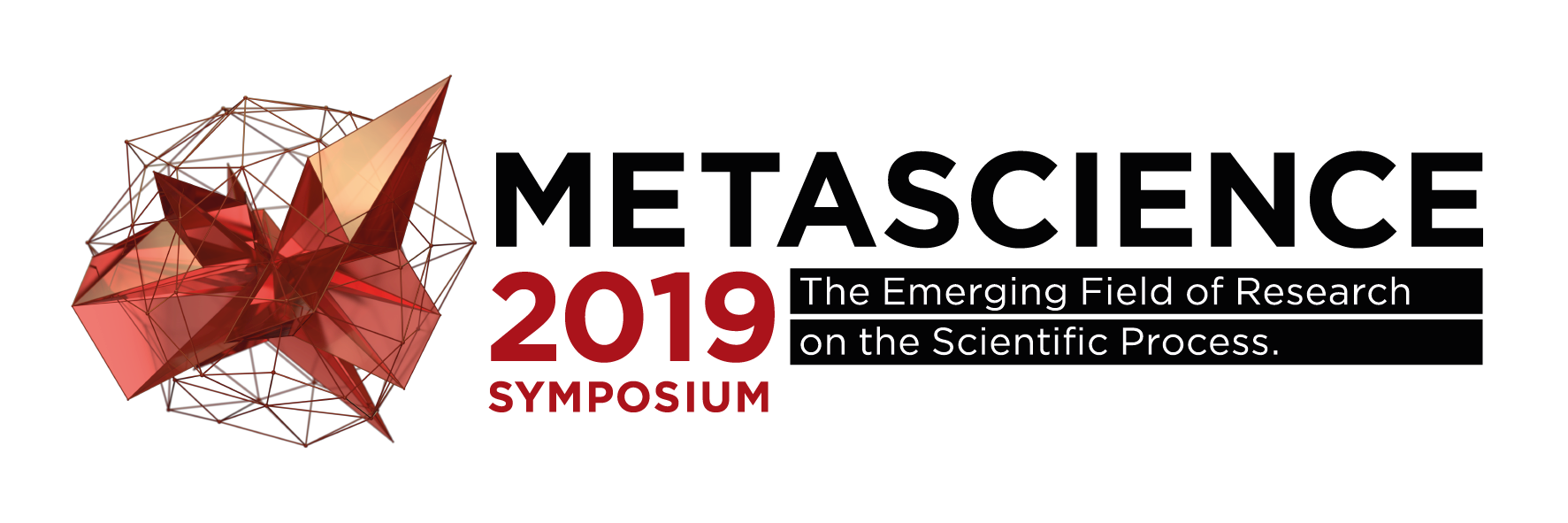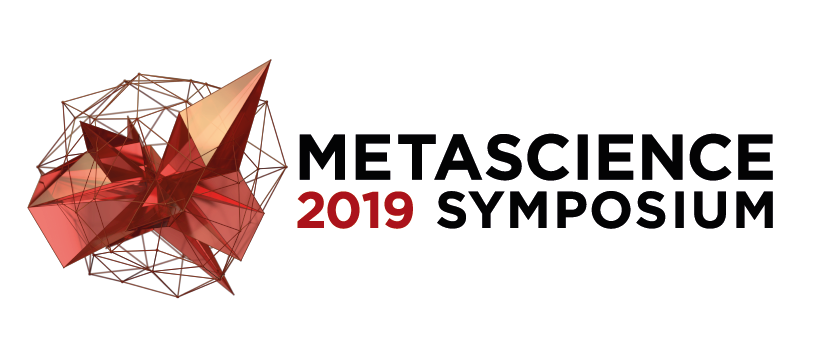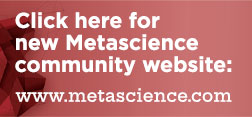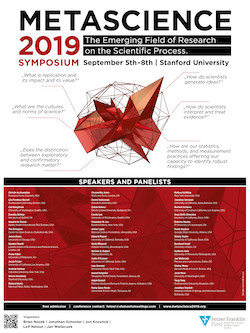Click on a day to open the whole timetable for this particular day.
DOWNLOAD FULL PROGRAM (PDF)
DOWNLOAD FULL PROGRAM (PDF)
PRE-CONFERENCE: WEDNESDAY, SEPTEMBER 4, 2019
- 4:00 – 6:00 PM
- Audio/visual equipment test and rehearsals, as needed (Cubberley Auditorium)
For speakers and panelist
- 6:00 – 8:00 PM
- Welcome Reception (Poolside, Sheraton Palo Alto)
For hosted attendees only, registration required
THURSDAY, SEPTEMBER 5, 2019
- 6:30 – 7:30 AM
- Breakfast (Reception Room, Sheraton Palo Alto)
For hosted attendees only, registration required - 7:00 – 8:00 AM
- Registration (Cubberley Auditorium)
- 8:00 – 8:30 AM
- Welcome, Purpose & Logistics
Jan Walleczek, Brian Nosek, Jonathan Schooler - TOPIC 1: How Do Scientists Generate Ideas?
- 8:30 – 10:45 AM
- Dean Keith Simonton University of California, Davis
Scientific Creativity: Discovery and Invention as Combinatorial
- Roberta Sinatra IT University of Copenhagen
Quantifying the evolution of scientific careers - Melissa Schilling New York University
Where do breakthrough ideas come from? - 10:45 – 11:00 AM
- Coffee Break
- 11:00 – 12:30 PM
- Jacob Foster University of California, Los Angeles
Made to Know: Science as the Social Production of Knowledge (and its Limits) - Carole Lee University of Washington
Gender-based homophily in collaborations across a heterogeneous scholarly landscape - 12:30 – 1:30 PM
- Lunch
- 1:30 – 2:15 PM
- Marta Sales Pardo Universitat Rovira i Virgili
Collaboration patterns in science - TOPIC 2: What is Replication and Its Impact and Its Value?
- 2:20 – 3:05 PM
- Tim Errington Center for Open Science
Barriers to conducting replications – challenges or opportunities?
- 3:05 – 3:20 PM
- Coffee Break
- 3:20 – 5:35 PM
- Shirley Wang Harvard Medical School
What does replicable ‘real world’ evidence from ‘real world’ data look like?
- Jonathan Schooler University of California, Santa Barbara
How replicable can psychological science be?: A highly powered multi-site investigation of the robustness of newly discovered findings
- Daniele Fanelli London School of Economics and Political Science
Low reproducibility as divergent information: A K-theory analysis of reproducibility studies
- 6:00 – 8:00PM
- Dinner & Poster Session for all attendees (Centennial Lawn)
FRIDAY, SEPTEMBER 6, 2019
- 6:30 – 7:30 AM
- Breakfast (Reception Room, Sheraton Palo Alto)
For hosted attendees only, registration required - TOPIC 2: What is Replication, and Its Impact and Its Value?
**Continued from Day 1** - 8:00 – 9:30 AM
- Annette Brown Family Health International (FHI 360)
Is replication research the study of research or of researchers?
- Adam Russell Defense Advanced Research Projects Agency
Fomenting (Reproducible) Revolutions: DARPA, Replication, and High-Risk, High-Payoff Research
- TOPIC 3: How Are Our Statistics, Methods, & Measurement Practices Affecting Our Capacity to Identify Robust Findings? Does the distinction between exploratory (hypothesis generating) and confirmatory (hypothesis testing) research matter?
- 9:30 – 10:15 AM
- Bernhard Voekl University of Bern
Biological variation is more than random noise
- 10:15 – 10:30 AM
- Coffee Break
- 10:30 – 12:00 PM
- Michele Nuijten Tilburg University
Checking Robustness in 4 Steps - Steve Goodman Stanford University
Statistical methods as social technologies versus analytic tools: Implications for metascience and research reform
- 12:00 – 1:00 PM
- Lunch (Centennial Lawn)
- 1:05 – 3:20 PM
- Andrew Gelman Columbia University
Embracing Variation and Accepting Uncertainty: Implications for Science and Metascience - Zoltán Kekecs Eötvös Loránd University
How to produce credible research on anything
- Jan Walleczek Phenoscience Laboratories, Berlin
Counterfactual Meta-Experimentation and the Limits of Science: 100 Years of Parapsychology as a Control Group
- 3:20 – 3:35 PM
- Coffee Break
- 3:35 – 4:20 PM
- Edward Miguel University of California at Berkeley
Innovations in Pre-registration in Economics
- TOPIC 4: How do Scientists Interpret and Treat Evidence?
- 4:25 – 5:55 PM
- Carl Bergstrom University of Washington
The inherent inefficiency of grant proposal competitions and the possible benefits of lotteries in allocating research funding
- James Evans University of Chicago
The social limits of scientific certainty
- Evening
- 6:45 – 10:00 PM
- Private dinner by invitation only, vehicles depart from Sheraton Palo Alto
- Dinner on own for general attendees
SATURDAY, SEPTEMBER 7, 2019
- 6:30 – 7:30 AM
- Breakfast (Reception Room, Sheraton Palo Alto)
For hosted attendees only, registration required - TOPIC 4: How do Scientists Interpret and Treat Evidence?
**Continued from Day 3** - 8:00 – 10:15 AM
- Yang Yang Northwestern University
The Replicability of Scientific Findings Using Human and Machine Intelligence - Fiona Fidler University of Melbourne
Misinterpretations of evidence, and worse misinterpretations of evidence
- Cailin O’Connor University of California, Irvine
Scientific Polarization
- 10:15 – 10:30 AM
- Coffee Break
- 10:30 – 11:15 AM
- Daniel Kahneman Princeton University
The Psychology of Scientific Overconfidence: The Case of Psychology
- TOPIC 5: What Are the Cultures and Norms of Science?
- 11:15 – 12:00 PM
- Paula Stephan Georgia State University
Practices and Attitudes Regarding Risky Research
- 12:20 – 1:00 PM
- Lunch (Centennial Lawn)
- 1:05 – 2:35 PM
- Staša Milojević Indiana University, Bloomington
The Changing Landscape of Knowledge Production
- Dorothy Bishop University of Oxford
The psychology of scientists: The role of cognitive biases in sustaining bad science
- 2:35 – 2:50 PM
- Coffee Break
- 2:50 – 4:20 PM
- Jevin West University of Washington
Echo Chambers in Science?
- Simine Vazire University of California at Davis
Towards a More Self-Correcting Science
- 4:30 – 5:30 PM
- Open Discussion
- 7:00 PM
- Dinner on own this evening for general attendees
- Private dinner by invitation only
- Transportation will depart from Sheraton Hotel for invited guests
SUNDAY, SEPTEMBER 8, 2019
- 6:30 – 7:30 AM
- Breakfast (Reception Room, Sheraton Palo Alto)
For hosted attendees only, registration required - 8:00 – 9:15 AM
- Funder Panel: Review and Future Directions
Moderator: Brian Nosek
Panelists: Chonnettia Jones, Dawid Potgieter, Arthur “Skip” Lupia
- 9:15 – 9:40 AM
- Coffee Break
- 9:45 – 11:00 AM
- Panel Discussion: Reflections on metascience topics and findings
Moderator: Jon Krosnick
Panelists: Jon Yewdell, Lisa Feldman Barrett, Kathleen Vohs, Norbert Schwarz
- 11:00 – 11:10 AM
- Break
- 11:15 – 12:30 PM
- Panel Discussion: Journalists’ perspective on metascience and engagement with the broader public
Moderator: Leif Nelson
Panelists: Ivan Oransky, Christie Aschwanden, Richard Harris, Stephanie Lee
- 12:30 – 1:30 PM
- Lunch (Centennial Lawn)
- 1:30 PM – End
- Unconference (Centennial Lawn)




